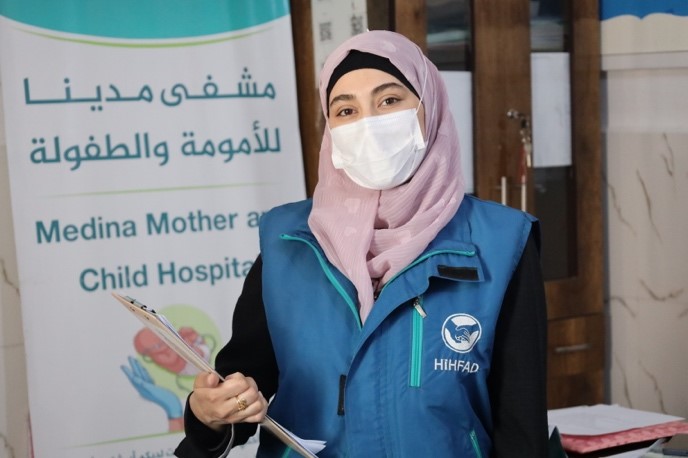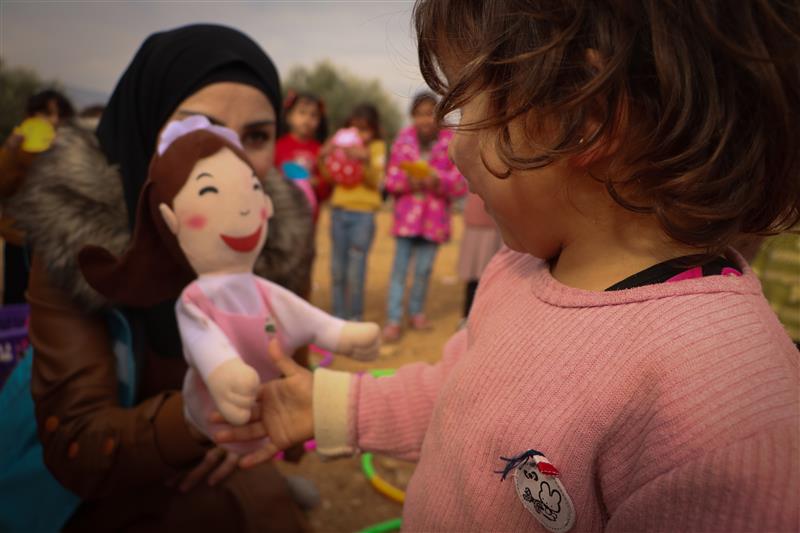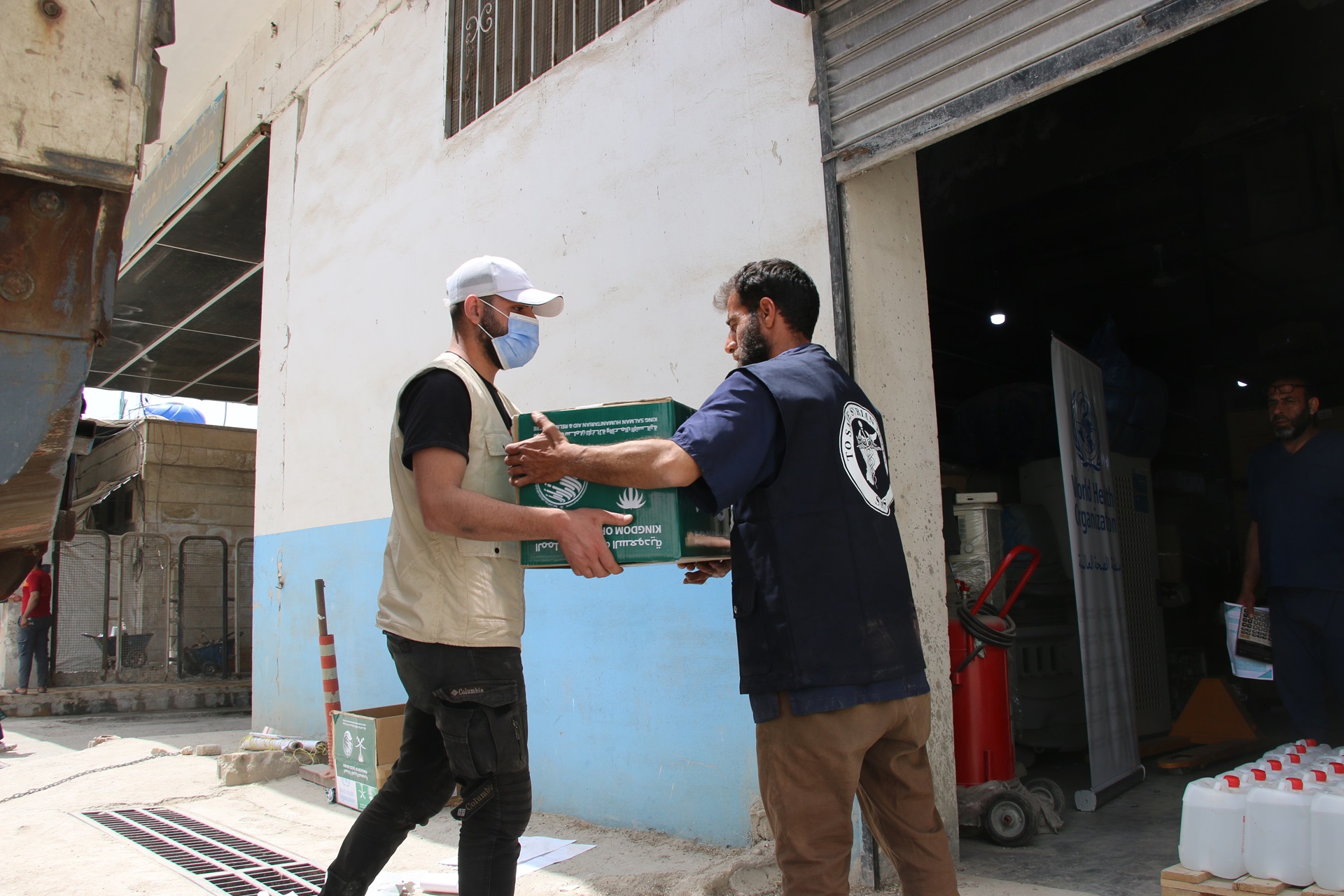Baraa Ismail, a psychologist working in Idlib, has witnessed a disturbing trend. "I received two cases of attempted suicide within a single week,” she says. “Both were referred to our clinic by other service providers. The first was a 12-year-old boy, the second a 22-year-old woman. Both were driven by poverty, but each carried a different weight of suffering."

Photo ©WHO: Psychologist working at a clinic in Idlib in northwest Syria
The child, neglected by his parents, showed signs of deep emotional distress and a desperate need for care and attention. In the young woman’s case, extreme financial hardship had forced her into an early marriage with an abusive partner. Isolated and unsupported, she endured gender-based violence that pushed her to the brink.
"The lack of protection — both social and legal — leaves people vulnerable. And as psychologists, we can only go so far without systemic support,” Baraa explains. “Neglect, domestic violence, and poverty aren’t just personal tragedies. They are public health issues that demand a stronger response from authorities."
In response to this alarming rise in suicide cases, the mental health and psychosocial support (MHPSS) Working Group under the Health Cluster has established a dedicated Suicide Prevention Task Force. This multi-agency initiative aims to reinforce frontline capacity, streamline referrals, and deliver culturally sensitive interventions to those most at risk.
But more is needed. Access to mental health services must be scaled up, psychologists’ work needs better oversight, and legal standard operating procedures (SOPs) should be shared widely with all staff involved in managing people at imminent risk of suicide— to ensure both patient and provider protection.
This crisis unfolds against a backdrop of broader systemic strain. After more than 13 years of conflict, Syria’s health system remains deeply fragile — battered by displacement, recurring outbreaks, economic collapse, insecurity, and environmental pressures. The situation is particularly severe in northern and coastal areas.
As the coordination of humanitarian response transitions from different areas of response (including cross border from Gaziantep for northwest Syria) into one coordination mechanism within country — a process scheduled to conclude by 30 June 2025 — there is growing concern about continuity of care of health services. The Health Cluster is working hard for deliberate and well-sequenced planning, otherwise critical service gaps may arise in return areas, many of which still lack functioning health infrastructure. Local authorities may not yet have the resources or autonomy to restore services, and gaps in coordination and oversight could further delay rehabilitation and limit access to essential care.
The system at breaking point

Photo ©WHO: Mental health experts in Idlib provide support to children who fled the November 2024 escalation and sought refuge in the camp.
The impact of the prolonged conflict is felt in every aspect of life. Many families remain displaced, some for years. Clean water is scarce. Malnutrition is rising. Landmines and unexploded ordnance add to daily dangers, while climate hazards stretch fragile services to their limits. The adversity and loss due to years under siege has also left deep mental scars, particularly among women and children.
Yet the health system is expected to deliver — often with dwindling resources and under threat of collapse.
By June 2025, 172 health facilities — including 11 general hospitals, 23 specialized hospitals, and over 100 primary health care centers — are projected to run out of funding. Without immediate support, large parts of northwest Syria could lose access to basic health services, disease surveillance, and emergency response capabilities.
In total, $48.7 million is required to keep these facilities operational for the next 12 months. Without urgent funding, essential health services — from maternal care to vaccination, trauma surgery to chronic disease management — could come to a halt.
A lifeline of coordination and commitment
In this unstable landscape, the Health Cluster, coordinated by WHO, brings together over 160 partners, including international and local NGOs, UN agencies, health authorities, and donors. Through 15 active technical working groups, partners collaborate to set standards, manage resources, and fill critical service gaps.
"Our strength lies in coordinated action,” says Dr. Mohammad Shafiq, Health Cluster Coordinator, Cross-border Türkiye -Gaziantep. “No single actor can manage this crisis alone — but together, we can keep the health system afloat and prepare for future shocks."
2025 priorities: respond, prepare, rebuild
To address urgent needs and lay the groundwork for recovery, the Health Cluster has outlined six key priorities for 2025:
- Access to integrated health services: Ensuring communities can receive trauma care, maternal and child health services, mental health and psychosocial support (MHPSS), immunization, and nutrition assistance.
- Emergency preparedness: Bolstering readiness for cholera, scabies, respiratory infections, extreme weather, chemical attacks, and mass casualties.
- Surveillance and rapid response: Expanding the Early Warning and Response Network (EWARN) to detect outbreaks early and deploy Rapid Response Teams.
- Quality and capacity building: Strengthening training for health workers, rehabilitation services, and referral pathways.
- Cross-cutting IPC and WASH programs: Promoting infection prevention and control and supporting community-led water quality surveillance.
- Early recovery and systems strengthening: Investing in a long-term health workforce strategy, improved supply chains, and robust health information systems.
Localizing response, listening to communities

Photo ©WHO: delivery of the dialysis consumables at Al-Hidaya Hospital
Beyond service delivery, the Health Cluster is prioritizing local leadership and community engagement. Area-based coordination hubs support localized decision-making. Community Health Workers, local NGOs, and technical task forces ensure that programs respond to real needs and cultural dynamics.
"We are moving from emergency-only thinking to building sustainable systems,” says Dr. Yasir El Ferruh, "Surveillance Coordinator at EWARN. “But this can only succeed if communities are part of the solution — not just recipients of aid."
According to a recent mapping exercise conducted by the Risk Communication and Community Engagement Task Force, communities in northwest Syria continue to rely heavily on informal networks, such as religious leaders, teachers, and community volunteers, for trusted health information. However, gaps persist in addressing misinformation around vaccinations, trauma care, and mental health. To close these gaps, Health Cluster partners are working to strengthen two-way communication channels and incorporate real-time social listening into program design. This includes feedback loops through WhatsApp groups, in-person consultations, and community reporting tools that ensure concerns from the ground inform decision-making at every level.
A dangerous future or a turning point
The stakes for 2026 are high. If funding gaps persist, the consequences will be dire: preventable deaths, rising epidemics, and a region pushed deeper into crisis.
But there is still time to change course.
As the humanitarian community begins a gradual transition toward one-Syria coordination, efforts are underway to ensure that systems, partnerships, and health responses are harmonized across operational hubs. This shift aims to strengthen national alignment, reduce fragmentation, and pave the way for more sustainable, inclusive health service delivery across the country.
With sustained investment, political commitment, and empowered local leadership, the Health Cluster and its partners can hold the line and begin to rebuild a system that not only survives the crisis but grows stronger because of it. “In Syria,” says Dr. Shafiq, “health is not just about services — it’s about survival, dignity, and hope. The world must not look away.”
